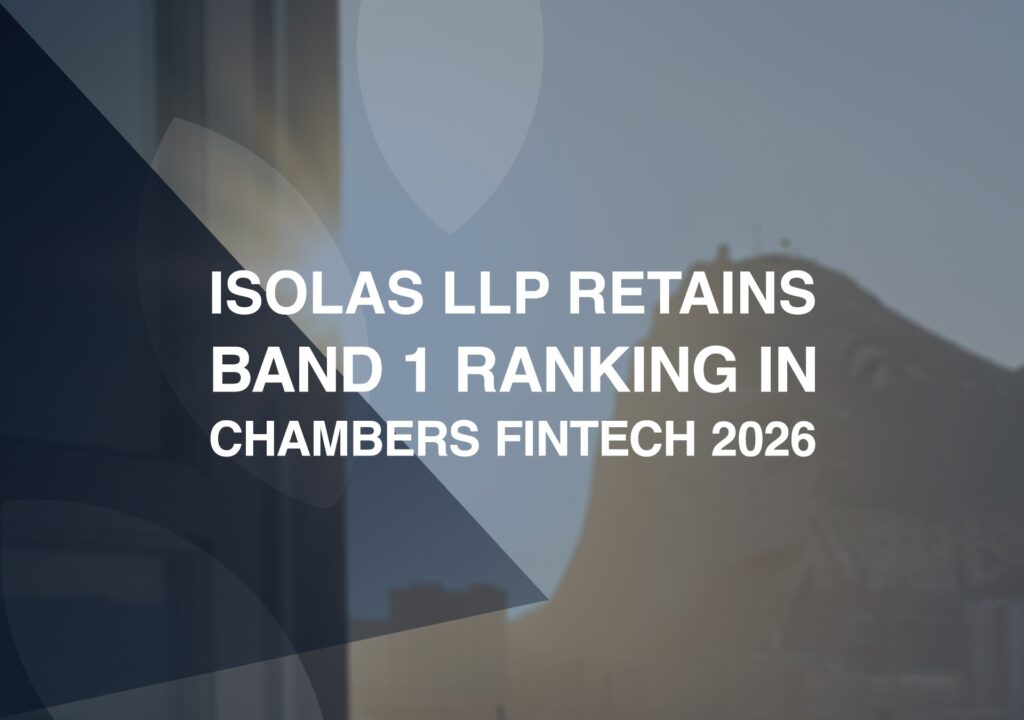Changes to the rules of cross-border law between Gibraltar and the UK and Gibraltar and Europe: looking forward
In the previous article of this two-part series (available here), we explored the key changes to Gibraltarian law on jurisdiction and recognition and enforcement of judgments brought in by the Civil Jurisdiction and Judgments (Amendment) Act 2025.
In this article we look forwards, examining how these changes are being implemented for legal cases which are already in progress. This article will also set out the future changes which are coming in this area, like the implementation of the 2019 Hague Convention in Gibraltarian law under the Recognition and Enforcement of Judgments (2019 Hague Convention etc.) Regulations 2025.
The impact on cases already in progress
Some cases with international elements will already be in progress, with arguments soon to be made about whether the courts of Gibraltar should have jurisdiction or whether a judgment should be recognised or enforced. For such cases, there are provisions in the Civil Jurisdiction and Judgments (Amendment) Act 2025 which mean that the old procedures for determining jurisdiction, recognition and enforcement as contained in the Lugano Convention, the Brussels Conventions and the Brussels Recast Regulation may continue to apply in Gibraltarian law.
In legal cases which were begun in a Gibraltarian court before 1 January 2021, the question of whether the Gibraltarian court or the courts of an EU or EFTA country or the UK should have jurisdiction to determine that claim will be decided in line with the Brussels Conventions, the Lugano Convention and the Brussels Recast Regulation, so long as these procedures would have applied before 1 January 2021.
Similarly, if a person obtained a judgment following a legal case that was started in the court of an EU or EFTA country or the UK before 1 January 2021, the question of whether that judgment can be recognised or enforced in Gibraltar will be decided in line with the Brussels Conventions, the Lugano Convention and the Brussels Recast Regulation so long as these procedures would have applied before 1 January 2021.
It is notable that the cut-off for the application of the Brussels Conventions is not 7 November 2025 (the date of the Civil Jurisdiction and Judgments (Amendment) Act 2025) but is earlier: 31 December 2020. Therefore, it might not be possible for a person who has obtained a judgment in a case that started in July 2023, while the Brussels Conventions were treated as being in effect in Gibraltarian law, to now rely on the Brussels Conventions to enforce the judgment in Gibraltar. Instead, that person would need to attempt to enforce the judgment under currently applicable procedures such as the 2005 Hague Convention or the common law procedure or (if they are applicable) the Brussels Recast Regulation or the Lugano Convention. Similarly, if a case were started in July 2023 in Gibraltar and there was a question as to jurisdiction which has not yet been decided, this might not be able to be determined under the Brussels Conventions.
The continued application of the Lugano Convention and the Brussels Recast Regulation for in-progress cases is slightly different. Apart from applying in respect of cases arising or judgments given before 1 January 2021, the processes set out in the Brussels Recast Regulation and the Lugano Convention also continue to apply for determining jurisdiction in legal cases begun in a Gibraltarian court before 7 November 2025, or recognition or enforcement of a judgment given by a court in an EU or EFTA country or the UK after 31 December 2020 but before 7 November 2025.
The correct procedure to follow for determining jurisdiction and recognition and enforcement of judgments in cases that are already ongoing is thus something of a patchwork.
The 2019 Hague Convention
The Civil Jurisdiction and Judgments (Amendment) Act 2025 also creates a power for the Minister for Justice to make regulations to implement into Gibraltarian law any international agreement which relates to private international law. This power has already been used, in the form of the Recognition and Enforcement of Judgments (2019 Hague Convention etc.) Regulations 2025 which were published on 13 November 2025. These Regulations will implement into Gibraltarian law the Convention on the Recognition and Enforcement of Foreign Judgments in Civil or Commercial Matters concluded on 2nd July 2019 at The Hague (known as the 2019 Hague Convention). It is notable, however, that the implementation of the 2019 Hague Convention into Gibraltarian law has not yet happened, as the Recognition and Enforcement of Judgments (2019 Hague Convention etc.) Regulations 2025 will not take effect until a further notice is published in this respect in the Gibraltar Gazette.
The 2019 Hague Convention relates to the recognition and enforcement of civil and commercial foreign judgments and, when implemented, it will allow more types of foreign judgments to be recognised and enforced in Gibraltar. To date, the contracting states are the UK, the EU (except Denmark), Ukraine, Montenegro, Uruguay, Andorra, and Albania. However, it is notable that unlike the Brussels Conventions, the Lugano Convention, the Brussels Recast Regulation or the 2005 Hague Convention, the 2019 Hague Convention does not apply to jurisdiction, only recognition and enforcement of judgments. Even in respect of recognition and enforcement of judgments, various matters are excluded from the scope of the 2019 Hague Convention, such as, among others, judgments on family law matters, insolvency, defamation and intellectual property.
Circumstances where the 2019 Hague Convention will apply include (among others): where the person against whom recognition or enforcement is sought was habitually resident or had their place of business in the country where judgment was given; where the person against whom recognition or enforcement is sought brought the claim in question or otherwise submitted to the jurisdiction of the country where judgment was given; where the judgment relates to obligations arising out of land situated in the country where the judgment was given; or where there is a contract, and the judgment is from a court in the country where performance of the contractual obligations happened (apart from in certain circumstances).
There is one other notable ground for recognition and enforcement of a foreign judgment under the 2019 Hague Convention which may plug a gap in the sort of judgments that can be recognised and enforced in Gibraltar under the 2005 Hague Convention (which already applies in Gibraltarian law). Under the 2005 Hague Convention, judgments can only be recognised and enforced from a country chosen by the parties under an exclusive choice of court agreement. Under an exclusive choice of court agreement, both parties agree that one specific court (and no others) will determine any dispute that arises between them, no matter which party starts the dispute. However, it might not be possible to recognise and enforce a judgment under the 2005 Hague Convention when that judgment has been obtained from a court in a country chosen by the parties through an asymmetric jurisdiction clause- e.g. Party A can sue Party B in any country, but Party B can only sue Party A in Gibraltar.
The 2019 Hague Convention, however, when implemented, will include a ground for the recognition and enforcement of a foreign judgment from a court in a country which the parties to the judgment had chosen (so long as the parties’ choice of court is not an exclusive choice of court agreement). This may therefore allow judgments obtained under asymmetric jurisdiction clauses to be enforced in Gibraltar, as for this ground of the 2019 Hague Convention to apply the parties need not agree that all proceedings be brought in the same court in the same country. This may give parties more flexibility in agreeing which country disputes between them should be brought in, while still allowing any judgment obtained under their agreement to be recognised and enforced in Gibraltar.
Even when the 2019 Hague Convention is implemented into Gibraltarian law, however, there will be exclusions as to its effect. In particular, it will not be possible to recognise and enforce certain judgments in relation to rights to land under the 2019 Hague Convention and certain judgments will not be able to be recognised or enforced against consumers.
Changes to appeals in respect of the 2005 Hague Convention
Apart from giving effect to the 2019 Hague Convention in Gibraltar law, when the Recognition and Enforcement of Judgments (2019 Hague Convention etc.) Regulations 2025 come into effect they will also alter the procedures for recognising and enforcing judgments in Gibraltar under the 2005 Hague Convention.
In particular, these new regulations will alter the appeals procedure for a decision of the Supreme Court to register a judgment so that it can be recognised and/or enforced in Gibraltarian law under the 2005 Hague Convention. Rather than appeals being made to the Court of Appeal, as they are now, they would instead return to the Supreme Court.
These new regulations will also introduce a new test setting out when the Supreme Court must overturn a decision to not register a judgment under the 2005 Hague Convention. Previously, the Civil Jurisdiction and Judgments Act 1993 was silent as to how the Supreme Court should decide an appeal against such refusals to register judgments.
Where next?
The Civil Jurisdiction and Judgments (Amendment) Act 2025 is just the latest example of Gibraltar making amendments to EU-derived law and other law connected with the EU. In this case, these amendments were due to the decision by EU and EFTA countries to not reciprocate in applying the rules in the Lugano Convention, the Brussels Conventions and the Brussels Recast Regulation to Gibraltar in the same way that Gibraltar was applying them to EU and EFTA countries. This is, however, very unlikely to be the end of the road for divergence between Gibraltarian law and EU law.
However, this may also not be the end of the Minister for Justice’s use of his power in the Civil Jurisdiction and Judgments (Amendment) Act 2025 to implement international agreements into Gibraltarian law. Gibraltar is, after all, included in the UK’s application to rejoin the Lugano Convention in its own right- though this application has been blocked for now. This may therefore be an interesting space to watch, particularly in the context of the new relationship being forged between Gibraltar and the EU in the post-Brexit treaty on Gibraltar and the EU, with a potential for future convergence instead of divergence from EU law.
As Gibraltar’s relationship with the EU continues to evolve, reliable advice on the law is more important than ever. ISOLAS LLP, your trusted advisor since 1892, can help you cut through the noise and confusion of the post-Brexit landscape to give you confidence and clarity in your cross-border transactions or disputes. Get in touch here.






